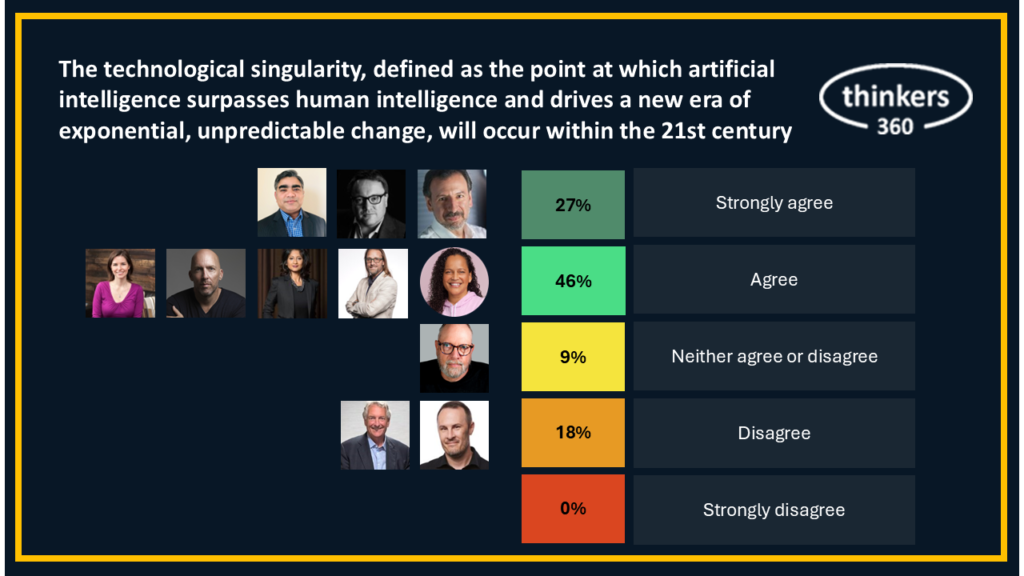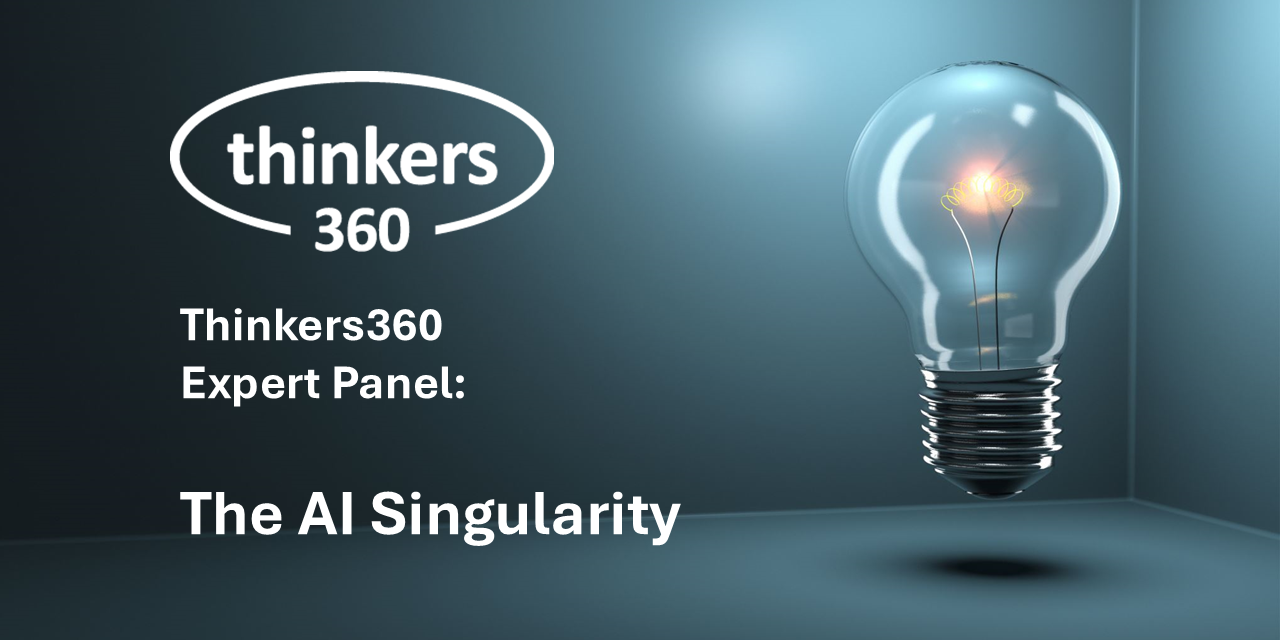Thinkers360 Expert Panel: Will the AI singularity drive a new era of exponential, unpredictable change?
Welcome to a new series from Thinkers360! We’re excited to present a fresh format for our Expert Panel discussions, offering a deep dive into the most pressing topics in technology and business. Rather than a traditional Q&A, we’ve curated a panel of our top thought leaders, including Thinkers360 Ambassadors, to respond to a single, provocative statement. This approach allows us to capture a wide spectrum of perspectives, from concise declarations to nuanced, detailed arguments.
For our inaugural panel, we asked a crucial question facing our society: “The technological singularity, defined as the point at which artificial intelligence surpasses human intelligence and drives a new era of exponential, unpredictable change, will occur within the 21st century.”
Panelists were asked to select one of five options: Strongly Agree, Agree, Neither Agree or Disagree, Disagree, or Strongly Disagree.
The results revealed a clear consensus among our experts. The vast majority of panelists lean toward the belief that the singularity is a question of when, not if. A combined total of eight panelists selected either Strongly Agree or Agree, with three individuals choosing Strongly Agree and five choosing Agree. Only two panelists disagreed with the statement, while none chose to Strongly Disagree and just one choose to Neither Agree nor Disagree. This distribution highlights a significant alignment of thought within the expert community, suggesting that the singularity is not merely a sci-fi fantasy, but a plausible and impending reality.

Thinkers360 – Expert Panel – AI Singularity
Among the experts, a core theme for those who agree with the statement is the accelerated pace of AI development. They pointed to AI’s growing ability to handle complex tasks, from designing new drugs to running millions of simulations, as evidence that the technology is advancing exponentially. As Olivier Gomez stated, “AI has already breached the last speed limit—research and development…
Once AI improves AI, capability growth stops being incremental and becomes explosive.” Several panelists, including Shamshad Ansari and Pascal Bornet, highlighted that AI is already outperforming humans in narrow domains and that its capacity for self-improvement will lead to an unpredictable leap in capabilities.
However, the expert responses also revealed a range of perspectives on the nature of this event. Thomas Koulopoulos described the singularity not as a sudden “thunderclap,” but as a gradual process already underway, where we’ve slowly outsourced cognitive functions to machines without protest.
As Kathleen Walch put it, “Intelligence is multifaceted, and human cognition encompasses emotional, ethical, and contextual dimensions that are difficult to replicate.” Olivier Gomez envisioned a “savage” initial phase of disruption where white-collar jobs are displaced and power structures shift, followed by a period of profound human enhancement and the end of “human limitation.”
Meanwhile, Michael Gale focused on the paradox of AI’s presence potentially reducing unpredictability, as it operates as a “rational optimizer” unlike humans who are “illogical supercomputers driven by emotion and intuition.” Kamales Lardi and Noelle Russell both cautioned that while the singularity may be inevitable, the focus should not be on the technology itself but on how we ensure it amplifies human potential, embeds ethics, and prioritizes human values.
On the other hand, the three panelists who expressed disagreement or neutrality had a more cautious view. They challenged the idea that AI will replicate the full spectrum of human intelligence, arguing that qualities like creativity, emotion, and intuition are not easily coded. Dave Ulrich proposed a formula of “Artificial Intelligence * Authentic Intimacy,” suggesting that AI is most effective when paired with human-led emotional and creative insights.
The other panelist who disagreed, Ian Barkin, viewed the singularity as a “fun cocktail party topic,” emphasizing that our inability to fully define human intelligence makes it a difficult benchmark for AI to surpass. Another neutral panelist, Michael Fauscette, questioned whether human and AI intelligence are even comparable, suggesting instead that they may “evolve along separate, incommensurable paths.”
As we reflect on these pivotal shifts, a new question emerges: How will these trends shape the future of business and technology? Read on to explore our expert panelists’ opinions in depth and join us on Thinkers360.com to be part of the conversation.
The technological singularity, defined as the point at which artificial intelligence surpasses human intelligence and drives a new era of exponential, unpredictable change, will occur within the 21st century
Agree
Strongly Agree
Strongly Agree
“The mistake most people make when imagining the singularity is assuming it will arrive with a thunderclap. The reality will be infinitely quieter and far stranger. The singularity isn’t an event; it’s a slope we’ve been sliding down for some time. Recent years seem to have accelerated that slope but that’s only because our need to solve ever bigger challenges has also increased exponentially. We’ve already outsourced memory, navigation, and decision-making to machines without protest. What we rarely realize is that the vast majority of AI is not the visible LLMs but the invisible ways it will find its way into outcries. The real “moment” will be when we realize that the systems steering our economies, research, medicine, and even our ethics are evolving without our explicit design. That will be the moment when AI begins to call us out for behaviors that undermine our purported values. All of that will happen well before the century’s close, likely within the next two decades. Ironically, by the time we can name it, the singularity will have already passed. And not just because AI suddenly became “smarter” than us, which it will well before then, but because we became dependent on a form of intelligence we neither fully understand nor control. And yet, it won’t feel like losing control. No more so than a car with driver assist today. It will feel safe, certain, reliable. It will feel like progress that we can’t imagine living without and wonder how we ever did. And that’s the most disarming part.” – Thomas Koulopoulos, Chairman/Founder, Delphi Group
Strongly Agree
The remarkable pace of AI advancement over the past decade makes it highly likely that the technological singularity will occur within this century. Progress in deep learning, large language models, multi-modal systems, and autonomous agents has been driven by exponential growth in computing power, increasingly advanced architectures, and vast, high-quality datasets. Emerging frontiers—such as neuromorphic computing, quantum AI, and brain–computer interfaces—are poised to accelerate this trend. Unlike earlier technological revolutions, AI can improve itself: once systems can redesign their algorithms, expand knowledge, and optimize performance autonomously, their capabilities can grow at an unprecedented rate.Equally important, AI is advancing toward replicating and integrating the five human senses—sight, hearing, touch, smell, and taste—that form the foundation of human cognition. Computer vision now rivals or surpasses human pattern recognition; speech technologies emulate hearing and speaking; haptic systems approximate touch; and e-nose/e-tongue devices capture chemical signatures for smell and taste. Multi-modal learning allows AI to merge these inputs in real time, as the human brain does—yet with potential to exceed it in speed, scale, and precision. This fusion of sensory capabilities and self-improving intelligence points toward AI surpassing human intellect, ushering in an era of rapid, unpredictable transformation. – Shamshad Ansari, CEO, President & Accure, Inc.
Agree
“Considering the current race to dominate the AI field among big tech companies, and the growing trends in some regions to remove ethical and governance barriers for AI application, I agree that technological singularity is likely to unfold within this century. We are currently already witnessing AI systems outperform humans in narrow domains, and the pace of development and human adoption accelerating. While singularity promises profound breakthroughs for society and business, it is crucial to NOT focus solely on the technology itself. The true impact of this shift will be measured by how it impacts people. As AI-based technologies become more capable, the decision that we make today will shape whether it amplifies human potential or deepens existing divides. The impact of such an event is not just about machines becoming more intelligent but ensuring AI systems are developed and deployed with empathy, ethics and inclusivity at its core. As technologists, we need to ensure humans adapt, evolve and remain central in the decision-making process. Singularity should not mean the end of human agency, but rather a turning point where we prioritize human values in an AI-driven world. At the core of this is digital literacy, building resilient institutions, designing transparent systems, and enabling people to thrive.” – Kamales Lardi, CEO, Lardi & Partner Consulting
Agree
“At the current pace of AI progress, I believe it is reasonable to expect the technological singularity to occur within this century—likely within the next 5–10 years. Advances in large-scale neural networks, agentic AI, autonomous decision-making, and self-improving systems are accelerating faster than most historical technological shifts. Each breakthrough builds on the last, compounding capabilities at a rate that already outpaces many expert forecasts from just a decade ago. While predicting the exact moment is impossible, the trajectory is clear: AI is moving beyond narrow tasks toward general problem-solving, creativity, and reasoning at—or above—human levels. Once these systems can iteratively improve themselves without human bottlenecks, we will enter a phase of exponential and unpredictable change. The real challenge is not if, but how prepared we will be to guide this transformation toward outcomes that are safe, equitable, and aligned with human values”. – Pascal Bornet, Keynote Speaker, Best-selling Author and Social Media Influencer at Intelligent Automation
Agree
“An important thing I’ve learned from working in AI is that predicting the future is inherently uncertain. One breakthrough can dramatically shift the trajectory. The pace of advancement suggests we’re nearing a threshold where machines may outperform humans in some increasingly complex cognitive tasks. Yet, the idea of a singularity where AI broadly and definitively surpasses human intelligence is unlikely to unfold in a binary, black-and-white fashion. Intelligence is multifaceted, and human cognition encompasses emotional, ethical, and contextual dimensions that are difficult to replicate. Moreover, such a shift would raise profound ethical, societal, and governance challenges. As someone deeply engaged in the AI community advocating for responsible AI innovation, I believe our priority should be preparing for transformative change through inclusive dialogue, thoughtful frameworks, and proactive leadership. Whether or not the singularity arrives this century, the exponential momentum of AI demands our attention and intentional stewardship now.” – Kathleen Walch, Director, AI Engagement and Community, Project Management Institute
Agree
“The singularity will hit before 2050 because AI has already breached the last speed limit—research and development. We now have models that can design new drugs, engineer materials, generate hypotheses, run millions of simulations, and refine solutions without waiting for human input. This means the core engine of progress—innovation itself—is now running at machine speed. Once AI improves AI, capability growth stops being incremental and becomes explosive.The opening act will be savage: white-collar elites replaced in months, governments legislating in slow motion while AI rewrites markets, flips power structures, and floods reality with flawless deepfakes. Control will belong to whoever controls the models.Then—snap—the chaos flips. Neural links fuse thought to compute. Energy flows endlessly from AI-designed fusion. Diseases vanish before they surface. Climate scars heal in years, not centuries. Knowledge becomes a direct download.The singularity won’t end humanity—it will end human limitation. But first, the slow movers will break, while the adaptive become something more than human.This is coming. And it’s coming fast.” – Olivier Gomez, Award-Winning AI & Automation Expert | Global B2B Influencer & KOL | Advisor | CEO @ IAC.ai
Agree
“I agree that the technological singularity will likely occur within the 21st century—but I see it not as a moment to fear, but as a defining opportunity for humanity. The pace of AI advancement is undeniable. In every industry, we are building systems that can learn, adapt, and make decisions at unprecedented speed. Yet, true progress isn’t measured by how quickly we reach the singularity, but by how wisely we get there. If we scale AI without responsibility, we risk amplifying bias, eroding trust, and creating inequities at global scale. But if we choose to embed ethics, inclusivity, and transparency into the DNA of every system we build, we can create an era where human and machine intelligence work in harmony to solve our most pressing challenges. The singularity’s arrival is inevitable. Whether it becomes our greatest leap forward or our deepest regret depends on what we build—and who we choose to become—right now.” – Noelle Russell, Founder and Chief AI Officer, AI Leadership Institute
Neither Agree Nor Disagree
Neither Agree Nor Disagree
“The concept of the technological singularity presumes that artificial and human intelligence are fundamentally comparable; destined to converge, compete, and for one to surpass the other. But what if this whole framework is misguided? What if the true transformation isn’t AI evolving past humans, but all of us redefining what ‘intelligence’ means together? Like different planets with distinct atmospheres, machine intelligence and human intelligence may evolve along separate, incommensurable paths. The “map” we use; the idea of intelligence as a single, measurable attribute; may not match the rich, varied “terrain” of actual experience. Rather than envisioning a singularity where one replaces or overtakes the other, perhaps we should anticipate a future of multiplicity, where diverse forms of intelligence; human, machine, hybrid; interact, collaborate, and shape the world in unpredictable ways. The very attempt to compare human and machine minds might be missing the point, limiting our imagination about what tomorrow could hold.” – Michael Fauscette, CEO and Chief Analyst, Arion Research, LLC
Disagree
Disagree
“The formula is AI * AI (Artificial Intelligence * Authentic Intimacy). This implies that Artificial Intelligence tools and algorithms will do an amazing job at accessing, assisting, and informing information with increased efficiency, but to guide and have sustainable impact requires Authentic Intimacy that provides creativity, emotion, and nuance to information. The “*” in the formula says that both AI and AI are required to best process information to improve decision making. The algorithms in Artificial Intelligence helps with structured data in spread sheets and in the past. The emotional and creative insights from Authentic Intimacy are found in unstructured data, personal experiences, and shape the future. Artificial Intelligence makes life easier; Authentic Intimacy makes it meaningful.” – Dave Ulrich, Rensis Likert Professor Emeritus, University of Michigan & Partner, The RBL Group
Disagree
You know, the singularity is a fun cocktail party topic – Ray Kurzweil’s vision of AI becoming smarter than us and flipping the table on reality.
But let’s pump the brakes. Our best neuroscientists can’t even agree on what human intelligence is. So why do we think a few clever software engineers are going to crack it wide open?
Sure, AI will get incredibly good at processing data, generating content, and doing tasks that make humans go cross-eyed. But the things that make us human-instinct, intuition, that gut feeling when something feels off – aren’t exactly lines of code. There’s a tribal, emotional intelligence we bring to the table that machines simply aren’t wired for.
Will AI outpace us in certain tasks? Absolutely. But surpassing the full spectrum of human intelligence? That’s a taller order. The real winners won’t be the companies chasing sci-fi fantasies of digital overlords. They’ll be the ones who know where AI excels – and where humans are still irreplaceable.
So, will the singularity happen this century? Maybe. But probably not in the way the headline writers hope. The future’s less “Skynet uprising” and more “AI stops deleting databases” – Ian Barkin, Co-founder, MagentIQ
###
Join us on Thinkers360 — Connecting Global Brands with the World’s Foremost Thought Leaders, Analysts and Influencers for Game-Changing Results!
Thinkers360 is the world’s first, largest and premier B2B thought leader, analyst and influencer marketplace — including academics, advisors, analysts, authors, consultants, executives, influencers and speakers — with over 100M followers on social media combined. We are differentiated by our unique patented algorithms that measure thought leadership and authentic influence looking far beyond social media alone.
Brands, Organizations & Startups: Sign up to find and work with advisors, analysts, authors, influencers and speakers in your niche and to amplify your own executives, thought leaders, and content among our opt-in B2B decision maker, analyst and influencer community with 100M+ followers on social media combined! We specialize in B2B expert network services, B2B thought leadership marketing, B2B strategic marketing, and B2B analyst and influencer relations putting your brand in front of active B2B buyers, analysts and influencers worldwide – Explore membership today!
Thought Leaders, Analysts & Influencers: To join the world’s largest opt-in B2B thought leader community and influencer marketplace, participate in our leaderboards, earn prestigious digital award badges and credentials, and build, amplify and monetize your professional brand – Sign-up today!
Readers & Writers: To contribute your own content and to browse amazing content – including articles/blogs, books, interviews, podcasts and videos, from our opt-in B2B thought leader, analyst and influencer community – Join Thinkers360 today!
Want to find and work with the world’s premier B2B advisors, analysts, authors, consultants, influencers and speakers (including access to our unique thought leader profiles and portfolios, in-depth reports and analytics, warm personal introductions, and our zero-transaction fee speaker bureau)?
Contact us to discuss any of your project needs at info@thinkers360.com
For advertising and sponsorship opportunities, please contact info@thinkers360.com.










